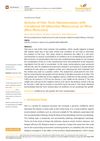 May 2003 in “Journal of Investigative Dermatology”
May 2003 in “Journal of Investigative Dermatology” The meeting covered advances in understanding hair growth, causes of hair loss, and potential treatments.
9 citations,
July 2021 in “Journal of Medicinal Food” Lactobacillus paracasei HY7015 helps hair grow in mice.
 53 citations,
January 1993 in “Biochemical Pharmacology”
53 citations,
January 1993 in “Biochemical Pharmacology” Minoxidil needs activation to work, and minoxidil sulfate helps with hair growth and blood pressure.
30 citations,
October 2013 in “BMC dermatology” VEGF gel increases hair growth but may have potential toxicity.
14 citations,
July 2017 in “Pakistan Journal of Zoology” Fenugreek leaf extracts significantly promoted hair growth in mice with alopecia.
 8 citations,
September 2021 in “EMBO Molecular Medicine”
8 citations,
September 2021 in “EMBO Molecular Medicine” A new small peptide may help hair growth by activating a specific receptor and should be tested in humans.
 April 2023 in “Biomedical Journal of Scientific and Technical Research”
April 2023 in “Biomedical Journal of Scientific and Technical Research” Indian head cactus extract may help hair grow by boosting important cell activity and gene expression.
40 citations,
January 2018 in “International journal of trichology” Healthy scalp reduces hair loss by managing oxidative stress.
 28 citations,
December 2005 in “Journal of cosmetic dermatology”
28 citations,
December 2005 in “Journal of cosmetic dermatology” Apple procyanidin applied to the scalp may help grow hair without side effects.
 9 citations,
April 2019 in “Biomolecules & Therapeutics”
9 citations,
April 2019 in “Biomolecules & Therapeutics” Udenafil may help hair grow by activating certain stem cells.
 2 citations,
January 2019 in “Annals of Dermatology”
2 citations,
January 2019 in “Annals of Dermatology” Melandrium firmum extract helps mice grow hair by blocking a hair loss enzyme and changing hair growth genes.
2 citations,
January 2016 in “Advanced biomedical research” The hair wax with propolis and Eruca sativa seed oil promotes hair growth effectively.
 1 citations,
September 2022 in “KnE medicine”
1 citations,
September 2022 in “KnE medicine” Candlenut oil hair tonic helps mice grow hair, with higher oil concentration giving better results.
 1 citations,
May 2022 in “Scientific African”
1 citations,
May 2022 in “Scientific African” Oleogels made from Cedarwood and Rosemary oils can enhance hair growth, but combining both oils doesn't increase the effect.
 1 citations,
February 2021 in “Journal of Natural Remedies”
1 citations,
February 2021 in “Journal of Natural Remedies” Ficus religiosa and Morus alba extracts improved hair growth and follicle regeneration in mice.
 1 citations,
February 2017 in “Journal of pharmacology & clinical research”
1 citations,
February 2017 in “Journal of pharmacology & clinical research” The herbal hair gel with Eclipta alba and Lippia nodiflora extracts was more effective at growing hair than the control gel and minoxidil.
 April 2024 in “Journal of translational medicine”
April 2024 in “Journal of translational medicine” MJ04, a new compound, effectively promotes hair growth and is a potential topical treatment for hair loss.
 February 2024 in “Biomedical journal of scientific & technical research”
February 2024 in “Biomedical journal of scientific & technical research” Inositol and phytic acid together increase hair growth and density.
 January 2015 in “Springer eBooks”
January 2015 in “Springer eBooks” Fat-derived stem cells and their secretions show promise for treating skin aging and hair loss.
 January 2017 in “Cogent Medicine”
January 2017 in “Cogent Medicine” Extracts improve hair growth in alopecia.
 370 citations,
September 1999 in “The New England Journal of Medicine”
370 citations,
September 1999 in “The New England Journal of Medicine” Finasteride and minoxidil are effective for hair loss, but continued research is needed for better treatments.
99 citations,
January 2004 in “Progress in brain research” Neurotrophins are important for hair growth and could help treat hair loss.
 86 citations,
October 2005 in “Experimental Dermatology”
86 citations,
October 2005 in “Experimental Dermatology” The Foxn1 gene mutation causes hairlessness and immune system issues, and understanding it could lead to hair growth disorder treatments.
 43 citations,
October 2013 in “Journal of Investigative Dermatology”
43 citations,
October 2013 in “Journal of Investigative Dermatology” Organotypic culture systems can grow skin tissues that mimic real skin functions and are useful for skin disease and hair growth research, but they don't fully replicate skin complexity.
 33 citations,
September 2017 in “Molecules”
33 citations,
September 2017 in “Molecules” Red ginseng oil and its components help promote hair regrowth and could treat hair loss.
 14 citations,
April 2018 in “ACS Biomaterials Science & Engineering”
14 citations,
April 2018 in “ACS Biomaterials Science & Engineering” Nanoemulsion is a promising method for delivering luteolin to promote hair growth without minoxidil's side effects.
 12 citations,
April 2019 in “Scientific Reports”
12 citations,
April 2019 in “Scientific Reports” A protein called HMGB1 helps hair grow by affecting prostaglandin metabolism.
11 citations,
March 2015 in “Life sciences” Vitamin D3-activated cell byproduct promotes hair growth in mice by increasing blood vessel growth.
2 citations,
December 2021 in “Pharmaceutics” Finasteride-loaded proniosomes effectively promote hair growth in mice.
 2 citations,
November 2021 in “International Journal of Applied Pharmaceutics”
2 citations,
November 2021 in “International Journal of Applied Pharmaceutics” The phytosome lotion made from Mangkokan leaf extract was more effective for hair growth than 2% minoxidil, especially at 30% concentration.






















